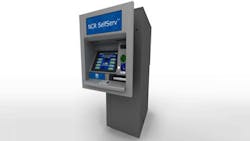NCR: A Healthy Global Company Means More US Jobs
At age 128, NCR Corp. (IW 500/186) has learned a few things.
The company, best known for manufacturing ATMs and kiosks, was one of the first global companies, according to Jennifer Daniels, general counsel for NCR. Currently the company operates in over 100 countries and employs 25,000 with one third of the workforce located in the U.S.
What the company has learned is that in order to be competitive, it must compete globally which in turn requires a global footprint. At a meeting on Feb. 4 entitled “Perspectives on Global Enterprises, Corporate Location Decisions, and U.S. Policy Challenges” sponsored by the Information Technology and Innovation Foundation, Daniels explained that some of her company’s biggest competitors are outside the U.S; they are in Germany, Brazil, China and other places. And in order to be innovative in those markets NCR needs to be physically located in those countries.
“We are not seeking the lowest cost manufacturing location but instead consider manufacturing as a differentiator,” Daniels says.
“We need to manufacture close to our customers as it enables us to innovate directly on-site with them,” she said. “We get ideas about how to improve based on customer feedback."
And sometimes those customers are in the U.S.
In 2009 the company decided to open an ATM manufacturing facility by refurbishing an existing plant in Columbus, Ga., “Our decision to bring our North American ATM manufacturing in-house was driven by our belief that as self-service ATM technology becomes more innovative and strategic to financial institutions, the ability to control manufacturing in key markets becomes a core and competitive advantage to our growth strategy,” said Peter Dorsman, senior vice president of Global Operations at NCR. “By in-sourcing the production of our SelfServ ATMs, we will decrease time-to-market, improve our internal collaboration, and lower our current operating costs.”
The new facility is also close to NCR’s innovation center in Duluth, Ga., which is the company’s global headquarters. The global customer service organization is located in Peachtree City, Ga.
The state of Georgia has been instrumental in NCR’s decision to open the Columbus plant. The company receives support in terms of incentives, training an on-going educational support. Daniels pointed out that the company used the Quick Start program to train new employees and has a close relationship with Georgia Tech and other universities.
“We were able to open this location due to our partnership with the state of Georgia,” Daniels said.
And it’s this partnership that she would like to see replicated on a federal level. One of the first changes that need to be made to make that happen, Daniels says, is tax reform. Her preference would be the OECD (Organization for Economic Co-operation and Development) countries' average 25% corporate tax rate.
A tax policy going in the right direction, according to Daniles is the proposal to make the R&D tax credit permanent since “there is a lot of competition globally with regarde to plant location. “As soon as you announce that you intend to open a new plant, the phone starts ringing from countries around the world competing for that investment."
One particular policy that some countries are implementing to ensure the home court advantage is what she calls forced localization or indigenous innovation. “While you used to see these types of policies in China or Nigeria, they are happening on a broader scale.”
India has issued rules favoring electronics manufactured in India, while Brazil and Argentina have different rules that have the same affect of favoring local production.
“So as manufacturers we have to set up shop in these markets in order to be considered local businesses," Daniels says.
However there is an upside to all of this.
“A healthy NCR globally means more jobs here in U.S. As a strong company we can invest in the U.S."
